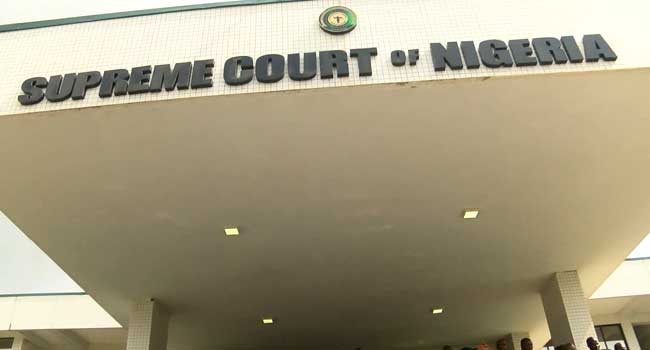
10 April 2021. Premium Times, Nigeria: The National Executive Committee (NEC) of the striking Judiciary Staff Union of Nigeria (JUSUN) met on Saturday and resolved to continue with their indefinite industrial action that has grounded courts nationwide since Tuesday.
The meeting was convened to take a position on Tuesday’s appeal by the Chief Justice of Nigeria (CJN), Tanko Muhammad, for the strike to be suspended.
PREMIUM TIMES reported that the union would be holding its NEC meeting this weekend, and subsequently, meet with state governors in a bid to find a solution to the crisis triggered by the workers’ demand for financial autonomy for the judiciary.
Speaking with PREMIUM TIMES at the end of JUSUN’s NEC meeting on Saturday, a top officer of the union, Jimoh Musa, said it would be hasty to call off the strike as requested by the CJN, because the state governors had finally scheduled a meeting with the union leadership on how to meet the workers’ demand.
Mr Musa, the National Treasurer of JUSUN, acting for the President of the union, Marwan Adamu, who is recuperating from the injuries he sustained in an auto crash on Tuesday, said the governors might not have any reason to go on with the scheduled meeting if the strike is called off before the consultation.
“We met and we came up with a resolution appreciating the CJN as a father. We looked into his demand, and we said since the people concerned (the governors) and we have scheduled to have a meeting.
“It is better to hold the meeting with them first before taking a decision.
“He (the CJN) should not feel bad that we did not grant his request.
“If we yield to his request before meeting these people, they may not even meet with us,” Mr Musa said.
Governors, minister to meet striking workers
Mr Musa told PREMIUM TIMES that the meeting with the governors had been scheduled for Wednesday.
According to him, the meeting will be attended by the representatives of the governors, parliamentary workers’ union, and the Permanent Secretary, Federal Ministry of Justice, Dayo Akpata, who heads the technical committee for the implementation of the Executive Order 10 signed last year by President Muhammadu Buhari in respect of the matter.
He said the governors had promised to present their “proposed modality for the implementation of the two arms of government” to both the judiciary and parliamentary workers’ unions at the scheduled meeting.
Further appealing to the CJN to be patient with the union, Mr Musa said, “we will meet with them, and if we get proper commitment, we will resolve to suspend the strike.”
He also said the labour minister, Chris Ngige, had invited the union leadership to a meeting on Monday.
Only on Thursday, the Nigerian Bar Association (NBA) decried the seeming silence of the federal government over the crisis.
Financial autonomy
The workers had on Tuesday embarked on the indefinite nationwide strike in protest against the denial of the judiciary its constitutionally-guaranteed financial autonomy which was also affirmed by a Federal High Court judgment delivered by Adeniyi Ademola, a now retired judge of the court, in January 2014.
Under the Nigerian Constitution, the judiciary ought to be in the first line charge of state and national budgets, with the funds standing to the credit of the third arm of government in the budgets released to the various heads of courts through the National Judicial Council (NJC).
While this is being complied with at the federal level, it is not so at the various states, where the governors only release funds to the judiciary as they please.
But another aspect of the autonomy which is still be infringed upon by both the federal and state governments is the judiciary being able to submit its budget to the National Assembly for passage without routing it through the executive arm of government.
The governors are largely seen as opponents of financial independence of both the judiciary and the legislature at the state levels.
They exhibited the trait by filing a suit to challenge the legality of the Executive Order 10 signed by President Muhammadu Buhari last year to the enforcement of the constitutional provisions on the financial autonomy of both the judiciary and the legislature at the state levels.


